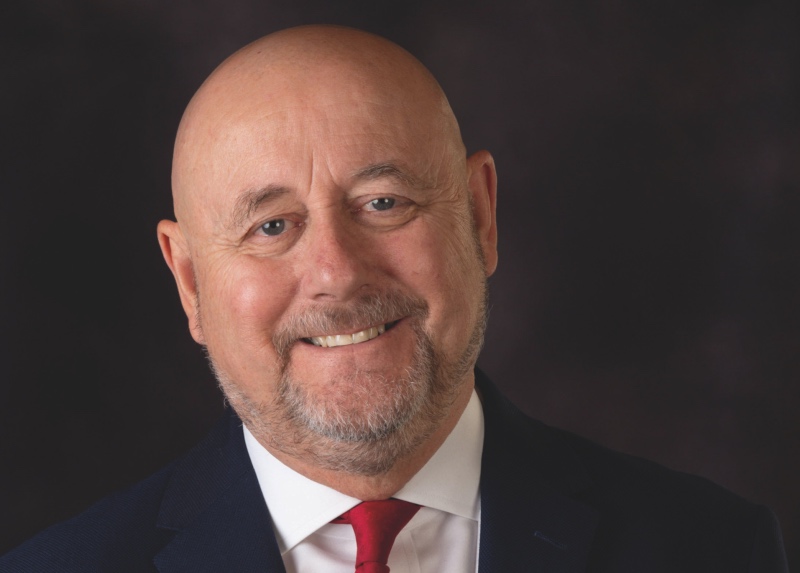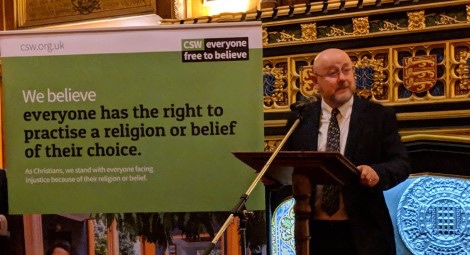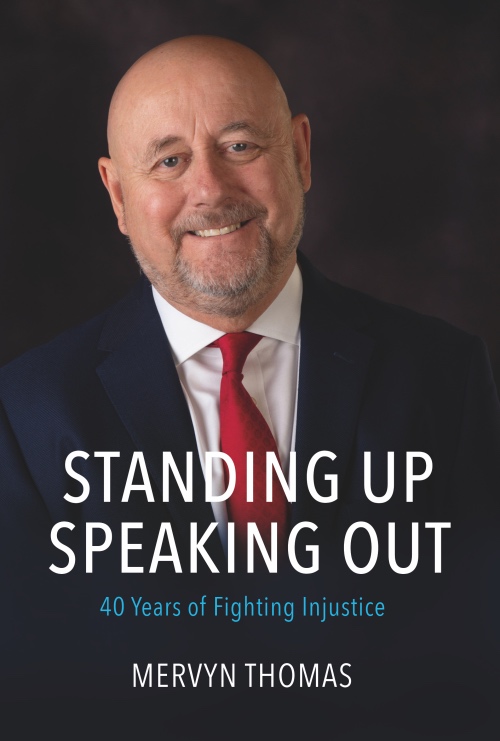
DAVID ADAMS speaks with Mervyn Thomas, chief executive of UK-based religious freedom advocacy, CSW…
Mervyn Thomas, chief executive of UK-based religious freedom advocacy, CSW, speaks about how he came to help form the organisation, some of the highlights and challenges he faced in his 20 years as CEO and the state of religious freedom around the world today…
Firstly, congratulations is in order. You were appointed a Companion of the Most Distinguished Order of St Michael and St George in this year’s New Year’s honours in the UK. What does such an award mean to you?
“I am deeply humbled to be recognised in this way, but it isn’t ‘my’ award alone. It’s an award for CSW – for the amazing staff, our trustees, volunteers and supporters. Anything that I have achieved personally I could not have achieved without the committed, loyal, talented and incredible team around me. It is on their behalf that I accept this great honour, and also on behalf of the many thousands of courageous Christians and other religious minorities around the world who daily put their lives on the line for what they believe.”
For those who may not be aware, what is CSW?
“CSW is [a] Christian human rights organisation advocating for freedom of religion or belief. As Christians, we stand with all those facing injustice because of their religion or belief. Our team of specialist advocates work on over 20 countries across Africa, Asia, Latin America and the Middle East to ensure that the right to freedom of religion or belief is upheld and protected.”

Mervyn Thomas speaking at the launch in January of his autobiography, ‘Standing Up, Speaking Out: 40 Years of Fighting Injustice’, in the UK Parliament. PICTURE: Courtesy of CSW
“I never expected God to call me to this work, and for that calling to have shaped and sharpened my faith in the way that it has. I have made some of the closest friends of my life in this work, and in almost 40 years of tackling injustice on behalf of persecuted communities, my Christian faith and relationship with God have been deepened, challenged and expanded in ways I never could have imagined.”
I understand you were one of the founding members of CSW some 40 years ago. When did you first start to feel a stirring to be an advocate for religious freedom and how did that lead you to helping to form CSW?
“At the time I was working for a friend, Catholic MP David Atkinson, in Parliament. He invited me to join him at an event about the persecution of Christians in Eastern Europe. I confess that at that point in time I knew very little about the persecution of Christians around the world, and had no idea that this was to become my ‘main thing’ in terms of ministry. I joined David at a meeting in Parliament, and by the end of it, I found myself agreeing to become one of the founding board members of CSW! As I drove home that evening, God spoke to me very clearly: showing me that, in fact, this was very clearly part of His plan for me. He told me that He wanted me to be involved in establishing something that, to my mind, looked like a Christian version of Amnesty International.”
How did that intertwine with your personal journey of faith?
“I never expected God to call me to this work, and for that calling to have shaped and sharpened my faith in the way that it has. I have made some of the closest friends of my life in this work, and in almost 40 years of tackling injustice on behalf of persecuted communities, my Christian faith and relationship with God have been deepened, challenged and expanded in ways I never could have imagined. I can recall countless times when God has provided for CSW at just the right time.”
This year marks 20 years in the role of chief executive of CSW. What’s been a couple of highlights for you since you took on the role?
“There have been so many, it’s hard to choose! One of my personal highlights was meeting the late Pope Shenouda III during my first visit to Egypt in 2011. Although it started as a formal meeting, it soon became clear that this wasn’t like many other meetings I’d been part of. As soon as I met Pope Shenouda I knew I was in the presence of a man of God – he exuded the love and presence of God. What was supposed to be a 30 minute meeting turned into two hours of intense conversation, much to the frustration of his private secretaries! It was a special time that was to shape and inform the way we were to work on Egypt going forward.
“More recently, visiting northern Iraq to meet Yazidis and Christians who’ve been targeted by IS was an experience I will never forget. As you can imagine, it was a visit that I approached with some apprehension given the security concerns, but it was a visit that left a lasting impression. We visited Sinjar, where, in 2014, almost 10,000 Yazidis were killed or kidnapped when IS advanced on the region, in what has been officially recognised as an act of genocide by the United Nations. As we approached Sinjar city, I saw clothes strewn across the mountainside. Our guide explained that when IS advanced on Sinjar, people fled, discarding their belongings as they did so. Those who survived are now living in harsh conditions in tents in a valley at the very top of the mountain range. They have nothing left – and many have lost all hope for the future. It showed me what it is to follow Jesus’ teaching in the parable of the Good Samaritan; to cross the road to help our neighbour in need.”
And what have you found the greatest challenges?
“I think the greatest challenge is the feeling of helplessness in the situations where we can’t do more. In Iraq I met a Christian woman called Mariam who had been trafficked by ISIS. She told us she’d been trafficked 16 times in Iraq and six times in Syria. She recalled her traumatic experiences in detail: how she was tied to a pole in the street for people to inspect her before they ‘bought’ her. She fought every person who tried to violate her. After telling us her story, she broke down and begged for our help to get her out of there. I don’t think I’ve ever felt so helpless. We’re doing all we can to help her leave the country, but the reality that she is one of thousands of women with similar stories.”
We’ve noticed that CSW tends these days to be identified as CSW rather than Christian Solidarity Worldwide. Has there been such a shift and what prompted it?
“You’re right, there has been a shift. For a long time we’ve been widely known, and held in high regard in advocacy circles as CSW, so it was a very natural step for us to move to use of the acronym. We are proud of our Christian identity and heritage, and that remains foundational to the organisation, but as part of a strategic review, we recognised and agreed that in order to reflect our mandate more effectively we needed a brand that reflected our vision more accurately.”

Mervyn Thomas’ autobiography. PICTURE: Courtesy of CSW.
How would you describe the state of religious freedom around the world today and are things improving or deteriorating?
“That’s a good question! There are have been very definite improvements in awareness around the world. Many countries have appointed special envoys or ambassadors for freedom of religion or belief, and we regularly see the issues raised or debated in the UK Parliament, at the United Nations and by many other governments around the world. Also, last year the United States hosted the first ever Ministerial to Advance Religious Freedom in Washington. That said, improvements in awareness sit against a backdrop of widespread, continued, and, in some countries, escalating, abuses of the right to freedom of religion or belief. The Pew Forum’s ninth annual study reported increasing restrictions on religious freedom. This is the second year in a row that saw restrictions in the 198 countries increasing.”
If you had to name the three greatest crises with regard to religious freedom, what would you say they are?
“It’s always hard to compare the suffering and injustice being experienced by individuals and communities in different countries, but if I had to highlight three situations that concern us at the moment, I’d focus on Nigeria, China and India. In Nigeria, Christians and other non-Muslim minorities experience very real threats in multiple ways. Not only is the terrorist group Boko Haram continuing with violent attacks against non-Muslims or those who do not share their ideology, but also Christians in northern and central Nigeria face violent attacks from Fulani militia, who displace them and occupy their land. There was a staggering number of casualties in 2018 alone in attacks by this militia. Local observers describe the violence as a campaign of ethnoreligious cleansing; it claimed 1061 livesin 601 attacks in the first quarter of 2018 alone.
“Meanwhile in China, we’ve seen the government intensify its crackdown on Christians and other religious groups over the last year. Authorities across China continue to harass worshippers and restrict religious observance at state-approved churches by removing religious symbols from buildings, banning under-18s from religious activities, and forcing churches to install cameras and sing pro-Communist songs. In India, pluralism is under threat from extreme Hindu nationalist ideology, and the last few years have seen a worrying increase in attacks on religious minorities. Anti-conversion laws are routinely used to justify violence against Christian targets and to create hostility towards minorities. Our contacts in India are concerned that under the BJP government, intolerance towards religious minorities is being normalised, and Hindu nationalists who carry out attacks against religious minorities are emboldened.”
How can Christians around the world help in advocating for religious freedom around the world?
“There are three really easy and practical ways Christians can help tackle injustice:
“1. Campaign for Leah Sharibu, a 15-year-old Nigerian schoolgirl who was abducted by Boko Haram along with other school girls a year ago, but is still being held captive because she refused to convert in exchange for her freedom.
“2. Encourage someone who is in prison because of their faith, or who puts themselves at risk because they defend the rights of others. You can use CSW’s Connect & Encourage booklet to send a card or letter to encourage them today.
“3. Pray for those facing injustice in over 25 countries on which CSW works. Our weekly prayer alert provides you with all the latest prayer needs.
“You can find out more at: www.csw.org.uk/getinvolved.”
What can they be praying for in that regard?
“Please pray for all those facing persecution or discrimination because of their beliefs. Pray that they would be protected and know God’s peace and security. It’s also important to pray that God would comfort the loved ones of those facing persecution, especially of those who have been imprisoned or killed.
“We must, of course, pray for our leaders around the world as well, that their eyes would be opened to the crises facing people of all faiths and none across the globe, and that God would give them the wisdom to know how to tackle these issues.
“We are also instructed in the Bible to pray for those that persecute you, so, as difficult as that may be sometimes, I encourage you to pray that all those responsible for violations of freedom of religion or belief would come to know God and abandon their paths of intolerance and persecution.”
Follow the link to buy Mervyn Thomas’ autobiography Standing Up, Speaking Out: 40 years of fighting injustice.





